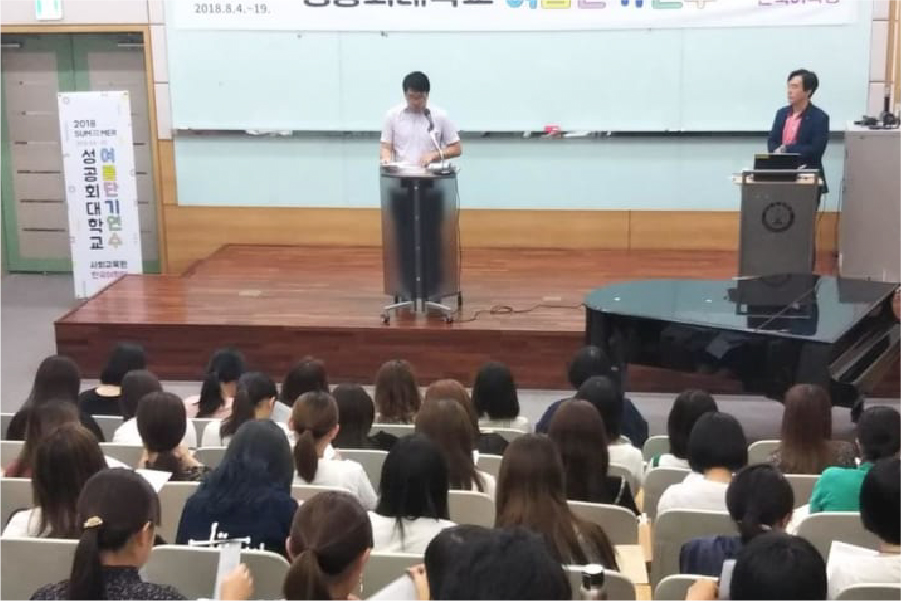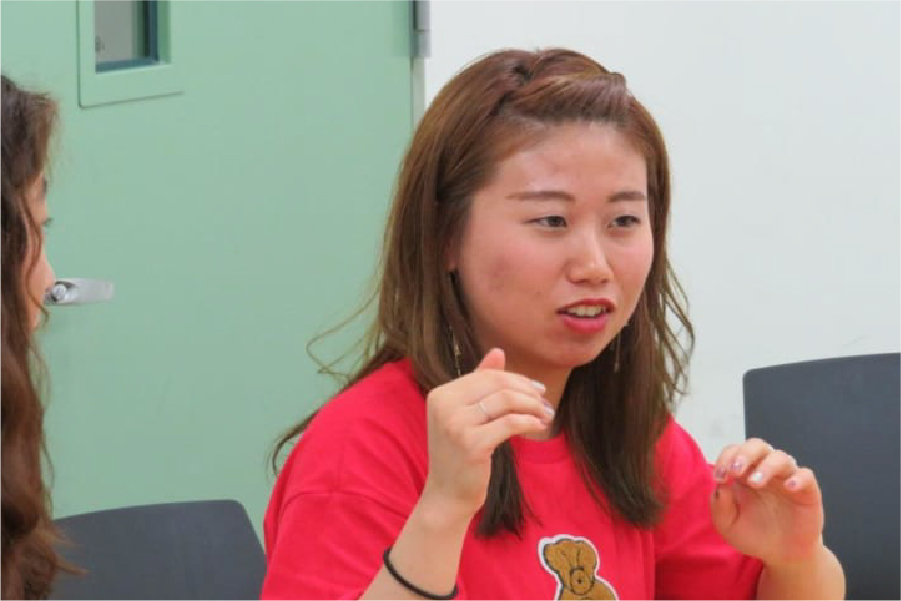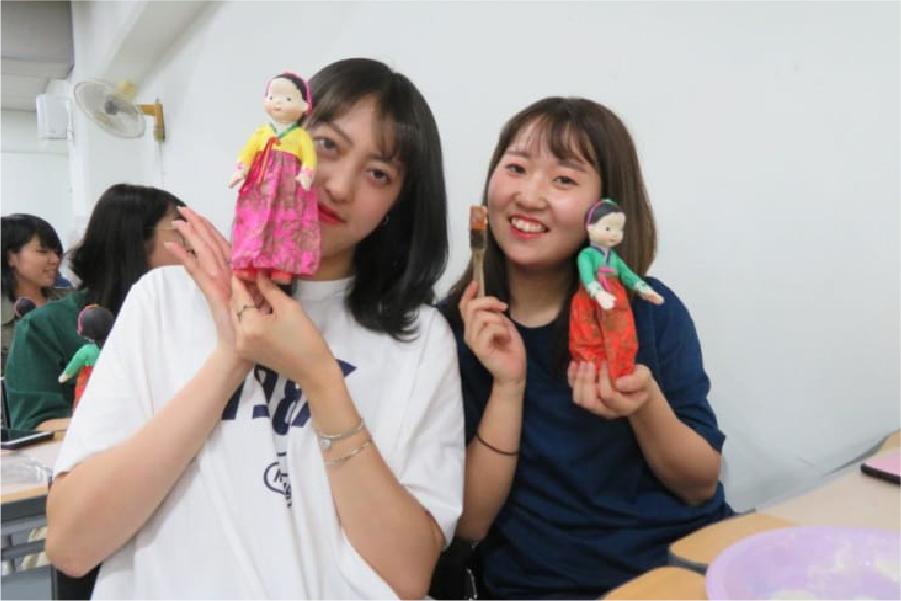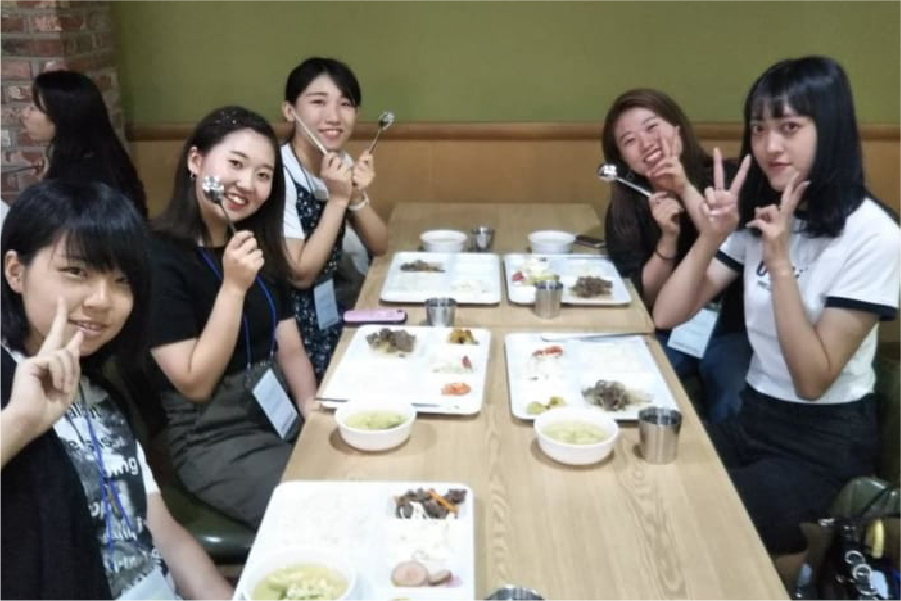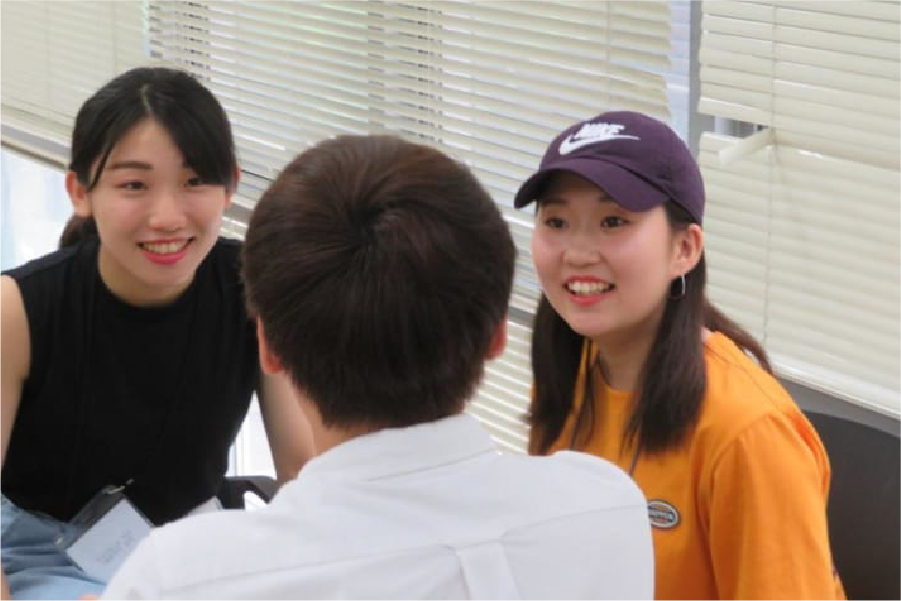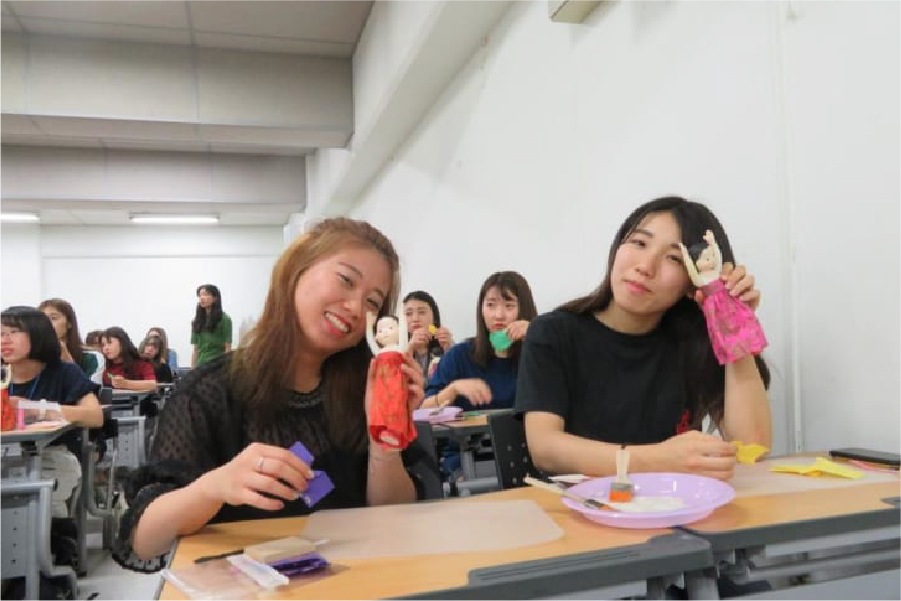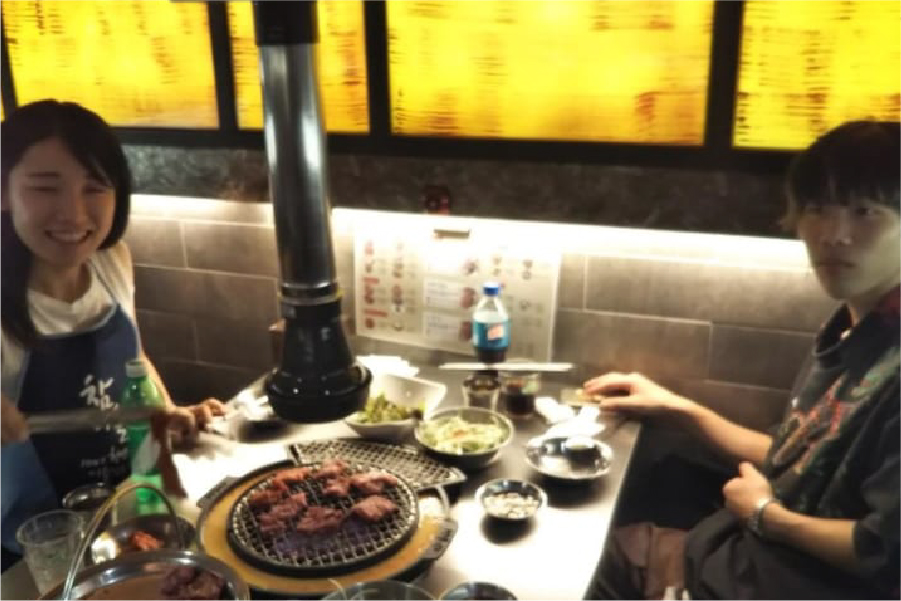*Please contact International Exchange Office for details.
Destination
Attended language school at Hanbat University (Korea)
Number of people recruiting
2 people
Study abroad period
From the first half of 2024 to within one year, or from the second half to within half a year (starting from March)
Qualification requirements
(1) Academic performance at our university must be GPA 2.25 or higher.
* Osaka Sangyo University Graduate School, international students, research students, non-degree students, etc. cannot apply.
*According to the regulations of Hanbat University, you are required to submit the results of your health checkup (including tuberculosis test) when completing the study abroad procedures.
Scholarships etc.
- Tuition Fees: Tuition fees are not required at the host institution, but tuition fees at our university must be paid.
- Scholarship: 150,000 yen/semester.
- Support funds will be provided by Osaka Sangyo University Society and Supporters Association (conditions apply)
- Self-pay: Travel expenses, overseas travel insurance, local living expenses (including student dormitory), etc.
(=Everything except tuition fees at the destination)
*If you withdraw from the university without returning to the university (or without obtaining a degree) after the study abroad period ends, or if you are expelled from the university, you will be required to return the amount equivalent to the scholarship and tuition fees at the host university.
School record
Students remain enrolled at our university during their study abroad period, and the period of study abroad is included in their enrollment period.
*If you wish to take a leave of absence and study abroad at a partner school, there are no scholarships available, but you can consult with us in advance.
Credit recognition
Credits earned while studying abroad can be converted into credits from our university (up to 48 credits) with the approval of the Faculty Council.
*Not all credits earned at the place of dispatch will be recognized.
Application method
Submit the following set of documents to International Exchange Office
*For ⑴⑵⑹ [prescribed forms], click on each form below, copy and fill out.
- Application form [designated form]
- Written oath [prescribed form]
- University transcript (copy of transcript is acceptable)
- learning plan
- Recommendation letter from our faculty
- Japanese essay “Reason for wanting to study abroad” (approx. 800 characters) [Prescribed paper (2 sheets)]
Selection
Korean written test (in-campus)
Exam date: Scheduled for early November
interview
Friday, November 17th Classroom 0306
Applicants will be comprehensively screened and selected based on the Korean written test, interview, academic performance, Japanese essay, etc.
Application deadline
October 31st (Tuesday) 16:00
Voices from senior participants
- 2018 Korean Summer Overseas Training Anglican University
-
17E
This was my first time to experience overseas training. I studied Korean for the first time when I took a Korean language course in my first year, and since I was interested in Korean, I really enjoyed being able to understand Korean little by little in class, so when I found out about this short-term training program, I immediately decided to study Korean. I decided to go to
There was a preparatory class before the training actually started, so I was able to remember things I had forgotten, and I was able to go to the training with less anxiety.
Everything about the overseas training was new to me, so I was full of expectations. As expected, unlike studying Korean in Japan, the teachers at the school in Korea are also Korean, and when you go out, you only hear Korean, which you cannot experience in Japan. I was able to experience this because I came to study abroad, so I was filled with a sense of fulfillment in everything I did every day. Although I lived in a dormitory, it was my first time to experience living in the same room as my friends every day, and I enjoyed every day with new things. In class, the teachers were kind and I was able to get along well with the people in my class, which was a great environment. Also, when I remembered what I learned in class and was able to listen and understand it when I went out for shopping, etc., I was very happy and could physically feel that I was getting used to the Korean language. Furthermore, I was able to think that it was a good idea to come to the training.
Being able to attend a university in South Korea was possible because I participated in overseas training, and I was able to learn a lot. In addition, on days when classes ended in the morning, weekends, and other days when there were no classes, we all went shopping or went to an amusement park, and we were able to do a lot of sightseeing in Korea. Since I was staying for 17 days, I had plenty of time to go to as many places as I wanted to go, and even on my days off, I was able to have a lot of fun.
I was able to learn a lot during this overseas training. Every day was filled with a sense of fulfillment that even exceeded my expectations before going to the training. These 17 days have been the most fulfilling experience I've ever had, and I feel sad that my stay here is gradually dwindling, and I've been enjoying the daily life in the dormitory, classes at school, and communicating with people I've met for the first time. Everything was new, fun, and I was able to spend 17 days with no regrets.
In terms of language, compared to before I went to the training, I was able to understand the Korean language better, and I was able to come up with words even when I was trying to convey my own words, so overall I was able to get used to Korean a little. I was able to feel it, so I think that was the best part of participating in the training. I want to make the most of this experience and continue to study a lot and work hard to improve my level even further.
- 2018 Korean Summer Overseas Training Anglican University
-
17H
After completing the 17-day short-term language training session from August 4th to 20th, what I felt the most was that Korean was easier to understand. Because I hear Korean every day and almost everything I see is in Korean, I can now hear and read much better than before. I felt a big difference between studying Korean in Japan and actually studying Korean in my home country. I had felt this before going to the training, but I felt it more strongly after actually experiencing it and seeing my own growth. I was not able to take Korean language classes at my regular school, so I had to study on my own and was worried about the difference between me and the students around me. However, I learned some vocabulary, self-introduction, and listening skills in the preparatory class, so I was able to approach the training with less anxiety. During the training, I was able to have fun learning Korean by having students from other departments who participated in the training teach me various words and having conversations using words that I usually understand and words that I had learned. It's done.
The content of the lessons at the training site will be focused on vocabulary according to the level of the class divided in the first test, learn grammar using the words learned, and repeat conversation practice and pronunciation practice. I was learning the most. Among the lessons that left an impression on me were the ones where we made business cards in Korean and exchanged them, we talked about our favorite things like idols and food, and we played games. Not only did I learn Korean through a structured class, but I also had fun learning it, which made it easier for me to learn Korean.
In addition, as part of the cultural exchange, we experienced the traditional performing art Samulnori with our eyes and ears, and then had university students directly teach us how to play the drums. During the break, we had a fun conversation and learned about delicious cold noodle shops around the university and recommended rice at convenience stores.
During the networking session, I tried to converse in Korean as much as possible, quickly looked up any words I didn't understand, and tried to speak using words I understood. The students at the university were studying Japanese, so they followed me up in Japanese and it was very easy to talk to them. On my day off, we went out to eat and went to karaoke together, and even though it was a special opportunity, I thought a lot about doing things that could only be done in Korea, and I was very happy and had a lot of fun.
This was my first experience of going to another country to study, but I really wanted to not only learn Korean, but also visit other countries and have various experiences. I could feel it.
- 2021 Korean Summer Overseas Training (Online) Anglican University
-
20P
During this year's summer vacation, from August 9th to 20th, I took a Korean language overseas training course for 10 days. I took the course because I thought it would help me become more familiar with the Korean language and gain experience that would be a plus for my regular classes.
When I participated in the online class on the 9th, the day of the class, all the conversations were conducted in Korean. To be honest, I couldn't understand everything. My native teacher spoke to me, and I realized how much I still need to get used to it.
During the placement test on the first day, I tried to communicate with the teacher, but I couldn't do it well at all. Even though I understood the question, I couldn't think of the words I wanted to answer, and I felt frustrated. It made me realize that the ability I aspire to achieve and the ability I currently have are far apart. Perhaps because I felt sorry for not being able to answer, I somehow made the mistake of saying "I'm sorry." Then, the other teacher said, ``You don't need to be sorry. It's okay. Thank you for studying Korean. Let's talk, write, and study together. It's okay.'' He told me several times that I didn't need it. It made me feel so much better, and I felt so grateful.
On the second day, classes were decided and classes began. For the first time, I met my classmates face to face. Even at university, we rarely meet each other, so it was really fun to meet people who were interested in the same things.
The teachers on Monday and Tuesday were very attentive to us. Her careful pronunciation was very easy to understand, and she made sure to check that I understood the meaning and was conscious of communication. The teachers on Wednesday, Thursday, and Friday spoke a little faster, and I felt that the class pace was faster. However, by repeating the same words and explaining them to me, I was able to naturally understand the meaning, what I wanted to say, and what I needed to do now. I think being able to get used to the speed is a big plus point.
Although the teachers were of slightly different types, I found them to be very well-balanced and I was able to spend a meaningful time with them. At first, I was nervous and anxious because everything was taught in Korean, but I couldn't have imagined that classes without Japanese would benefit me so much. Also, it was my first time meeting and talking with a native speaker, so I had a valuable experience that I had never had before, and it was very refreshing. I was also happy to hear that you felt so welcomed.
The Korean students also systematically reviewed their lessons, talked about things that are currently famous and popular in Korea, and were able to obtain real information about Korea rather than from the media. I think it was a good opportunity.
One thing that has changed greatly for me through the training is the way I feel when listening to others. At first, I was in a state of panic, thinking, ``Huh? What are you saying?'' I listened desperately, trying to catch even the slightest bit of words I could understand. However, as I got used to classes taught only in Korean, I got used to listening calmly. Honestly, there are times when I don't understand, but by organizing my head, I've been able to understand words that I couldn't understand before. By calming down and listening slowly, you will also notice that words you know are being said. I felt that this was a change that I was able to make because I only listened to Korean in class.
Also, unlike before the training, I feel that I have become quite familiar with the content regarding proper number words and Chinese number words. Before the training, I found it difficult to use them properly and to get used to them. In fact, numbers were often used in class. It's confusing at times, but I feel like I've gotten used to it. It was an experience that made me realize once again that in order to get used to something, how important it is to be exposed to it.
To be honest, since I wasn't going to the site, I was worried about whether it would go well and whether I would be able to complete it without any problems. However, to my surprise, I had a very fulfilling day without any trouble and was able to communicate with others while checking their faces.
I would like to make the most of these fulfilling days by reviewing and studying daily to make Korean more my own. In the future, when the day comes that I can go to Korea, I would like to work even harder so that I can enjoy communicating with the local people.
I am really glad that I participated in the training. There were various benefits such as being able to try new things, learning about my own level, and increasing my motivation. I was able to have an experience that I had never had before, and it's not something that anyone can do, so I'm glad I took part. I plan to use it in my Korean language classes in the second semester. Thank you very much.
- 2021 Korean Summer Overseas Training (Online) Anglican University
-
20P
I participated in the online Korean language summer training course that was held for 10 days from August 8th to 19th this year.
Since I was a high school student, I had wanted to study abroad, so I decided to enroll at this university that has a Faculty of International Studies. However, from the year I enrolled, I spent two full years of university life in which face-to-face classes were not possible and even traveling abroad was difficult due to the coronavirus. In my third year, I had to start thinking about job hunting, and when I looked back on my university life, I realized that I hadn't taken on any challenges. There, I learned that there was an online training program for Korean, and since I had taken Korean language classes when I was in my first and second years, I didn't have a chance to come into contact with Korean until my third year. I had almost forgotten about it, but I decided to try it out and participate in the summer training.
There was a placement test one week before summer training started. I actually used Zoom to communicate with a native teacher. It was very difficult to understand everything that was being said. I was able to somehow understand the sentences using the words I knew and the words I could hear. I was full of anxiety and nervousness as classes would start in a week.
My class was taught by two teachers, one on Monday and Tuesday and one on Wednesday, Thursday, and Friday. On the first day, I just learned about the teacher's self-introduction and some grammar. From the second day, I learned a variety of grammar and used it to solve problem sentences and have conversations with the teacher and other students. In my class, there were people who could understand Korean to some extent, and people who were learning Korean for the first time through this Korean language summer training course. Although each student had a different understanding speed, the teachers' explanations were very easy to understand, using examples and showing slideshows with illustrations until everyone understood. The class pace was neither too slow nor too fast, making it easy to learn.
The most memorable thing for me was the time I spent communicating with Korean university students. Every day during the 4th period, I had time to review the grammar I had learned that day while having conversations with Korean university students. When I had trouble communicating, they spoke to me in 365体育官网 or used a translator. Also, after finishing the assignment given by the teacher early, I had time to have a free talk with a Korean university student. Most of the students who participated in the summer training program are fans of KPOP, so they can talk about KPOP with Korean university students, and once they get used to it, they can ask each other questions about their favorite foods and places they want to visit in Japan and Korea. I ended up having a really fun time. Also, on the last day, we exchanged SNS and made some Korean friends that we still send messages to. I hope to meet you someday when I go to Korea.
Through these 10 days, I was able to realize that I wanted to study Korean more and become better at speaking it, which also increased my motivation. It was a great experience and I'm glad I participated.
Thank you.


